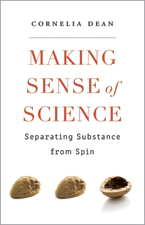
Cornelia Dean.
Harvard University Press, 2017; 296 pp;
ISBN: 978-0-67405-969-6.
By Laura Bowater
We are living through the teenage angst of the 21st century: a post-truth era in which objective facts are less influential in shaping public opinion than manipulative appeals to emotions and personal beliefs. Buffeted by alternative truths, counterintuitive truths and opposing truths, we are exhorted to sift out grains of scientific truth.
This is no small task. As William James, the 19th-century philosopher and psychologist, claimed: “There is nothing so absurd that it cannot be believed as truth if repeated often enough.” Picking through myriad facts and controversies conveyed in a jumble of scientific jargon, scientific misinformation or media hype is time-consuming and not for the faint-hearted.
Add to the mix the influences of political agendas and ideologies — as well as monetary motivations — and it should come as no surprise that citizens (and scientists) struggle to separate scientific substance from spin. As Cornelia Dean states succinctly in this well-written book, we live in a world where “researchers gather data; politicians, business executives, or activists spin it; journalists misinterpret or hype it; and the rest of us don’t get it.”
As if these external influences weren’t enough to contend with, there is the sink of irrationality that is the human mind. Dean deftly sketches how our ability to cut to the scientific truth is hampered by our inbuilt hardwiring and acquired belief systems. This is especially true when we are asked to make decisions or draw conclusions using the primitive risk and reasoning skills we have inherited from our ancient ancestors. Dean illustrates how this inherent vulnerability leaves us prone to manipulation that can be exploited by savvy lobbyists and influential stakeholders.
So how do we separate scientific substance from spin? The first step, Dean explains, is to understand what science is and what it is not.
This is not as easy as you might suppose, but she provides clues. Science asks and answers questions about the world around us, and it is naturally sceptical. Scientists set out to test and probe these answers using observation and experimentation. Any ideas that do not hold up to this scientific scrutiny are discarded. Dean puts it with admirable succinctness: “For an idea to be scientific it must have the capacity to be incorrect.”
However, scientific progress does not happen in a vacuum. Substantial funding and investment is required to underpin the research process, and scientific progress offers potential for substantial wealth generation. Money influences research decisions that include what is researched, the chosen methodologies, the results that are reported, and the conclusions that are drawn. Whether we like it or not, the influence of money, the pace of scientific discovery and the amount of data being produced are all on the increase. Looking to the future, we need a scientifically literate society that is prepared to discuss and debate the ethical, political and legal issues emerging hand in hand with scientific progress.
This engaging book offers non-scientists the tools to connect with and evaluate science, and for scientists it is a timely call to action for effective communication.
_____________________________________
Laura Bowater is professor of microbiology education and engagement at the University of East Anglia, and author of The Microbes Fight Back: Antibiotic Resistance (2016).
This review was first published in the May 11, 2017 edition of Times Higher Education. Reprinted with permission.